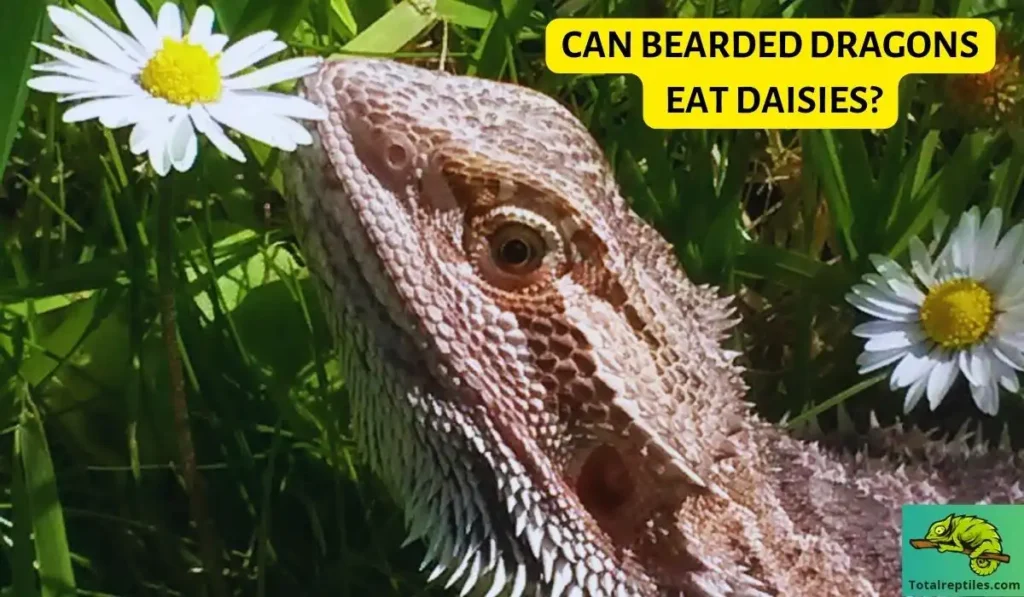The answer is definitely positive. These vibrant flowers can be a nutritious addition to your bearded dragon’s diet. However, there’s a caution. That is, only offer them pesticide and chemical-free daisies.
Once you’ve hand-picked the daisies, be sure to remove the stems and give them a thorough rinse under the faucet. This precaution ensures that your pet enjoys a safe and wholesome meal. Even you give wild daisies by following this process.
So, whether the tender flower buds or the leafy greens catch their fancy, rest assured that daisies can make a delightful treat for your bearded dragon.

Introducing Daisies: Types and Nutritional Profile
Daisies, with their cheerful blooms and delicate petals, are pleasing to the eye and can also offer nutritional benefits for your bearded dragon. Before diving into the specifics, let’s explore the various types of common daisies.
Common Daisy (Bellis perennis): The quintessential daisy, known for its white petals and vibrant yellow center, the common daisy is a popular choice for both gardens and bearded dragon diets.
Shasta Daisy (Leucanthemum x superbum): These showy daisies feature larger flower heads with white petals and golden-yellow centers. Their robust size makes them an appealing option for bearded dragons.
Table showing a breakdown of the nutritional composition per 100 grams of daisies:
| Nutrient | Amount |
| Calories | 45 |
| Carbohydrates | 9.4g |
| Protein | 3g |
| Fat | 0.4g |
| Fiber | 3.5g |
| Vitamin A | 586IU |
| Vitamin C | 35mg |
| Calcium | 0.09g |
| Phosphorus | 0.06g |
Want to learn more about the bearded dragon diet
CAN BEARDED DRAGONS EAT FLOWERS?
CAN BEARDED DRAGONS EAT ROSE PETALS?
CAN BEARDED DRAGONS EAT LAVENDER?
As you can see, daisies offer a low-calorie option packed with essential nutrients. They provide a decent amount of carbohydrates for energy, while their protein content supports muscle development in your bearded dragon. Fiber in daisies aids digestion and gut health.
Daisy’s vitamin A and C content is relatively high. Vitamin A helps with vision, growth, and immunity, while vitamin C boosts immunity.
These vitamins work together to support the reptile’s well-being.
These flower extracts include some calcium and phosphorus.
Calcium strengthens bones and teeth, while phosphorus boosts vitality. Maintaining the right balance of calcium and phosphorus is essential for the bearded dragon’s skeletal health.
Potential Benefits of Daisies For Bearded Dragon
Some key advantages of incorporating daisies into their diet:

- Nutritional Boost: Daisy provides carbohydrates, protein, fiber, vitamins, and minerals. These elements contribute to the bearded dragon’s overall health.
- Hydration Support: Daisies contain a high water content, aiding in hydration for your reptile. This is particularly beneficial during hot weather or when your bearded dragon requires extra moisture.
- Digestive Aid: The fiber content in daisies promotes healthy digestion in bearded dragons. It prevents constipation and promotes digestive health by regulating bowel motions.
- Immune System Support: Vitamin A and C are abundant in daisies. The immune system of your bearded dragon needs these vitamins to fight against diseases and infections.
- Enrichment and Variety: Introducing daisies to your bearded dragon’s diet adds variety and enrichment to their meals. Different textures and flavors stimulate their natural foraging instincts and keep them mentally stimulated.
Signs Of Allergic Reactions Or Digestive Issues
While daisies can benefit bearded dragons, it’s essential to recognize signs that may indicate allergic reactions or digestive issues. Some key indicators to watch for:
- Skin Irritation: Redness, swelling, or a rash after eating daisies may indicate an allergic reaction in your bearded dragon.
- Respiratory Distress: coughing can indicate an allergic reaction affecting the respiratory system. Monitor your bearded dragon closely for any such symptoms.
- Digestive Problems: Signs of digestive issues may include diarrhea, constipation, or a significant change in bowel movements. Vomiting or regurgitation after consuming daisies can also indicate a problem.
- Lethargy or Unusual Behavior: If your bearded dragon appears unusually lethargic, shows a lack of appetite, or exhibits changes in behavior, it could be a sign of an adverse reaction to daisies.
- Swelling or Itching: Swelling of the face or limbs and persistent itching or scratching can be signs of an allergic response.
If you notice any of these signs or suspect that your bearded dragon is experiencing an adverse reaction or digestive issues after consuming daisies, it’s crucial to consult a reptile veterinarian promptly.
Preparing Daisies For Bearded Dragons
Here’s a step-by-step guide on how to prepare daisies for your dragon pets:
Step-1: Select Pesticide-free Daisies
Choose pesticide-free and organic daisies to avoid exposing your bearded dragon to harmful chemicals. Avoid daisies from areas treated with pesticides or herbicides. You can choose wild daisies if it’s free from chemicals.
Step-2: Thoroughly Clean the Daisies
Before offering daisies to your bearded dragon, rinse them thoroughly under cool running water. This step helps remove any dirt, debris, or potential contaminants.
Step-3: Remove Stems and Check for Wilted Parts
Trim off the stems of the daisies, as they can be challenging for your bearded dragon to digest. Additionally, discard any wilted or discolored parts of the flower to ensure freshness.
Step-4: Serve Flower Buds and Leaves
Bearded dragons can safely consume the flower buds and leaves of daisies. These parts are typically more tender and easier to chew and digest.
Final Words
So, bearded dragons can munch on daisies, and These vibrant flowers offer nutritional benefits, hydration support, and digestive aid for your bearded pets.
Keep it to the limit as part of a balanced diet alongside other suitable veggies and insects.
If you notice any signs of allergies or digestive issues, consult a reptile veterinarian. Treat your bearded dragon to the wonders of daisies and watch them enjoy a colorful addition to their meals.

